Strictly Personal
Before they kidnap our president by Lasisi Olagunju
Published
2 years agoon

Singer and songwriter, Bukola Elemide, is better known as Asa. She was paid by the Nigerian state to perform on Tuesday last week in Abuja at the launch of the Nigerian National Petroleum Company Limited. Buhari was seated; many others who mis-run Nigeria with him were there too. They expected a Baba-has-done-well song because they were in the Villa tucked away from the groans of the grumpy, hungry poor. But black-clad Asa chose to ‘tickle’ them all with her song of rebuke: “There is fire on the mountain/ And nobody seems to be on the run/ Oh, there is fire on the mountaintop/ And no one is a-runnin’…” She sang and danced and sang and stopped. There was an applause. I am not sure it was as loud as it was supposed to be. Not all who had palms in that room clapped for the songstress. They were not sure which could be more seditious between their clapping and Asa’s song of fire. I won’t blame them. You never could tell, the president might understand the message! And why that particular song for that oily occasion? I watched the event and the song and the protest in the singer’s eyes. She appeared echoing Bob Dylan’s defiant explanation on a dark situation as that of Asa: “The song is a sort of striking out, a reaction to the last straw, a feeling of what can you do?”
Bob Dylan spoke about his song reacting to “the last straw.” The last straw would appear to be yesterday’s threat by Kaduna train attack terrorists to abduct our president and a state governor and others and sell off their captives. We’ve all watched the distressing video released by the terrorists. After thoroughly beating the unfortunate captives, they made an announcement; this: “Just as the Chibok girls that were sold off, we will equally sell these ones as slaves. If you don’t accede to our demands, we will kill the ones we need to kill and sell the remaining. By God’s grace, El-Rufai, Buhari, we will bring you here…” Scary. I wanted to say we should beg these fellows to leave our president alone because his freedom is our collective freedom, but then I remembered that the Villa is the safest house in Nigeria. And that is where the president lives.
I was in Accra, Ghana, two weeks ago. The very first nightu there, at some minutes past 10pm, I felt an alien presence by my hotel room door. Some people may be in deep sleep, yet they are awake. I think I belong to that group. William Shakespeare in Macbeth describes sleep as “death of each day’s life, sore labour’s bath, balm of hurt minds, great nature’s second course, chief nourisher in life’s feast…” Mahatma Ghandi, father of India, had his own version of what sleep is. He told his country: “Each night, when I go to sleep, I die. And the next morning, when I wake up, I am reborn.” That is sleep. My people say sleep is that thief that snatches whatever a child holds. But they also add that what is inside a child, sleep cannot take away. I was drifting deep into sleep; then that invasive feeling of strangeness by my door, then a knock and a hello.
Not every hello is from a friend. I knew that fact before I was born. I checked the time; it was 10.22pm. Who could that be? I used the peephole – some call it spyhole. A man in uniform, a security officer knocking at my door – at night, in a foreign country! I should open the door; after all, I entered Ghana fulfilling every demand of the law. But, you know, not everyone in security dress is a security man. We saw that fact at an APC event in Abuja last week where the roue were dressed in costumes of the puritan. My Latin-speaking friend would say “cucullus non facit monachum (The cowl does not make the monk).” Wearing a cassock does not make a man a bishop – not in Abuja, not anywhere. Whether home or abroad, never judge anyone by their external appearance. So, I froze the push to reply the ‘hello’ and open the door. Then I made to answer the knock; then the man in uniform started moving away. He left. I went back to bed. But on that floor of the hotel, I could hear doors loudly opening and closing, followed by human voices. I slept.
The next morning I was at the reception.
“What happened last night,” I asked the front office lady.
“We are sorry for what happened last night. It was the Immigration people,” she told me.
“Immigration in hotel rooms? What were they looking for.” I asked because it was strange to me.
“They do that randomly. Searching for illegal aliens. Sometimes they come at 2a.m. Catch them in bed, sort of. They want to be sure that the documentations we did on our guests correspond with what the guests hold. It is all for our country to be safe from unwanted guests.”
The receptionist noticed surprise in my eyes and asked: “Don’t your own Immigration people do that in Nigeria?”
I smiled.
While all that was going on, a private security man at the hotel gate was also saying ‘sorry’ to another guest, also a Nigerian. He explained that the Kuje jailbreak in Nigeria triggered the visit and several other visits to other hotels. The Kuje incident, you remember, unleashed 64 terror suspects on humanity. The fire on Nigeria’s mountaintop is noticed in Ghana and everyone there is running. No one wants deadly terrorists inside their bedroom. I reminded myself that my country is a very unusual country. Our security people are also unusual – things like enforcing rules against unwanted aliens hardly excite them; it is not profitable. Going after illegal aliens is apparently not part of the training my country gives its immigration men. It would be done only if it would fetch good fortune – like what they do with issuance of passports to Nigerians. Possession or renewal of a Nigerian passport by Nigerians is as difficult as entering the Kingdom of God; you hold the document only if you are strong and your breast plate is made of steel of diamond.
In and out of Ghana, the security men (and even cab drivers) I encountered at the decorous airport in Accra were well-dressed and courteous and businesslike. I arrived into the suffocation called Lagos airport and took more than a passing interest in how my country’s airport people handled their work. A very smart female superior officer was in charge of immigration procedures. Her men were in their cubicle attending to passengers’ passports the way they should. But the officer who attended to me was more on the phone than on duty. Perhaps, it was because it was a Friday. I should be forgiven for saying that. Here, Fridays are not for serious work. And I saw men in our airport doing security work in mufti. Should a uniformed force go to work without uniform – even if it was a Friday? James Hain Friswell (1825-1878) says dress has an effect upon character: “An ill-dressed man will never be so much at ease as one who is well-dressed…A mean and shabby appearance gives a man mean and shabby ways…”
Ghana appears to have better security sense than Africa’s most populous country. Wisdom is not assigned by number or by size We are a country of 200 million people badly managed and wrecked by collusion with the unthinkable. My own country does not mind being overrun by the fires of unwanted guests – from Niger, from Sudan, from Mali, from Chad, from Libya, from etc. They come and get grafted onto our stem. They are everywhere as I write, top to bottom. One day, aliens will rule over us – that is if it has not happened already. The cost for bad behaviour is very high. In December 1980, Nigeria experienced what history describes as the first major religious crisis in post-colonial Kano – the Maitatsine riots. It was led by one Mohammed Marwa, an illegal alien from Cameroun, whose entry was enabled by Nigeria’s unguarded openings and whose excesses were accommodated by the country’s complicit law – all because he was a preacher. That the riots officially killed 4,179 people is not the major tragedy from that war. The real tragedy is that Maitatsine riots deflowered Nigeria and prepared the ground for Boko Haram which has wrecked the North and its people and has murdered the peace of our country.
A train was going to Kaduna from Abuja 119 days ago, it was attacked by terrorists. Of the unknown number of passengers in that train, the terrorists killed some, they abducted many. There are 43 of the abducted still in captivity. A video of their horrific flogging by their abductors trended yesterday. Bulama Bukarti, a fellow at the Tony Blair Institute who watched the video and understood the language tweeted on Sunday that one of the terrorists said in the clip that “he was among those who escaped from Kuje Prison.” I saw frightened women, young and old; I saw terrorised children and infants in the video. And that scene is a Nigerian spot. Who is in charge here?
Nigeria is a huge mountain on fire and the whole world, except Nigeria, has noted that fact. That is what Ghana’s close attention to visitors from Nigeria means. Nothing saddens elders more than being told that an illness has no medicine, no corrective ritual. The creator of Nigeria gave it congenital deformity in manners and conduct that stultify its growth and the bloom of its flowers. Nothing will resolve the problem – not a 2023 continuation of APC/Buhari’s reign through Tinubu/èmi l’ókàn presidency; not a second coming of PDP/Atiku presidency; not Peter Obi and his ‘obidient’ warriors. Nothing. And you know what modern medicine prescribes as remedies for being born with defects: surgery, maybe, but compulsorily, long-term support. That is a little short of saying this country is an invalid that may go to its grave with its unresolved and unresolvable malformations. You may also want to ask: Those being paid to make things not to go bad, where are they? They are sleeping on duty while the nation burns in every part – from economy to politics to security to everything. The late Alaafin of Oyo, Oba Lamidi Adeyemi, in one of his many deep interventions, called our attention to what the palace drummer told the king every morning: “Get up, no one sends his child to the toilet to poo on his behalf.” A king-size job should be a king’s job. It is not so with Nigeria and its drivers. No one takes responsibility for nursing the invalid nation. Every delegate delegates here, leaving the job fatally undone – and without consequences. There was an attack on a prison very close to where the president calls official residence. A common slap on the wrist no one has received. A mass murderer, Adamu Aleru, was sensationally made a chief in Zamfara State days ago. The turbanning ceremony was not sprung as a surprise on Nigeria and its security agencies; it did not take place at night. The bandit gave enough notice of his public ceremony to all and it held with a bang. Big bandits bearing big names were reportedly in attendance. Nothing happened to the terrorist and his guests and nothing will happen to them. That is the dictionary definition of privilege. Aleru has even granted a press interview with the British Broadcasting Corporation (BBC) which is coming out today, 25 July, 2022, in a documentary entitled ‘The Bandit Warlords of Zamfara.’ In that documentary, you will hear this terrorist as he boasts, in cold blood, that while his men kidnap people, he kills people: “My men do that (kidnapping); I just go and kill them (people).” The world has come to an end in Nigeria.
Plato saw music as “a moral law” which “gives soul to the universe, wings to the mind, flight to the imagination, a charm to sadness, gaiety and life to everything. It is the essence of order; it lends to all that is good, just, and beautiful.” The president listened to Asa and her song of tears on Tuesday. The train terrorists spoke their threats on Sunday. If Asa’s words were too arcane for the king’s septuagenarian ear, his courtiers should do us a favour. Let them bring out the lines in giant print for the palace to gaze at and chew on. All of us, elitist complicit enablers of bad, in government, outside government, should pay attention to Asa’s ‘Fire on the Mountain’ – particularly the last stanza:
“One day the river will overflow
And there’ll be nowhere for us to go
And we will run, run
Wishing we had put out the fire.”
You may like
-


This Sudan war is too senseless; time we ended it, By Tee Ngugi
-


Air Peace, capitalism and national interest, By Dakuku Peterside
-


This is chaos, not governance, and we must stop it, By Tee Ngugi
-


Off we go again with public shows, humbug and clowning, By Jenerali Uliwengu
-


How patriarchy underpins gender violence today, By Tee Ngugi
-


Help! There’s a dangerous, secret plot to save the EAC from imminent death, By Charles Onyango-Obbo
Strictly Personal
This Sudan war is too senseless; time we ended it, By Tee Ngugi
Published
1 week agoon
April 28, 2024
Why are the Sudanese Armed Forces (SAF) and the paramilitary Rapid Support Forces (RPF) engaged in a vicious struggle? It is not that they have ideological, religious or cultural differences.
Not that people should fight because of these kinds of differences, but we live in a world where social constructions often lead to war and genocide. It is not that either side is fighting to protect democracy. Both sides were instruments of the rapacious dictatorship of Omar el-Bashir, who was overthrown in 2019.
Both are linked to the massacres in Darfur during Bashir’s rule that led to his indictment by the International Criminal Court for crimes against humanity. They both stood by as ordinary, unarmed people took to the streets and forced the removal of the Bashir regime.
None of these entities now fighting to the last Sudanese citizen has any moral authority or constitutional legitimacy to claim power. They both should have been disbanded or fundamentally reformed after the ouster of Bashir.
The SAF and the RSF are fighting to take over power and resources and continue the repression and plunder of the regime they had supported for so long. And, as you can see from news broadcasts, they are both well-versed in violence and plunder.
Since the fighting began in 2023, both sides have been accused of massacres that have left more than 30,000 people dead. Their fighting has displaced close to 10 million people. Their scramble for power has created Sudan’s worst hunger crisis in decades. Millions of refugees have fled into Chad, Ethiopia and South Sudan.
The three countries are dubious places of refuge. Chad is a poor country because of misrule. It also experiences jihadist violence. Ethiopia is still simmering with tensions after a deadly inter-ethnic war.
And South Sudan has never recovered from a deadly ethnic competition for power and resources. African refugees fleeing to countries from which refugees recently fled or continue to flee sums up Africa’s unending crisis of governance.
Africa will continue to suffer these kinds of power struggles, state failure and breakdown of constitutional order until we take strengthening and depersonalising our institutions as a life and death issue. These institutions anchor constitutional order and democratic process.
Strong independent institutions would ensure the continuity of the constitutional order after the president leaves office. As it is, presidents systematically weaken institutions by putting sycophants and incompetent morons in charge. Thus when he leaves office by way of death, ouster or retirement, there is institutional collapse leading to chaos, power struggles and violence. The African Union pretends crises such as the one in Sudan are unfortunate abnormally. However, they are systemic and predictable. Corrupt dictatorships end in chaos and violence.
Tee Ngugi is a Nairobi-based political commentator.
Strictly Personal
Air Peace, capitalism and national interest, By Dakuku Peterside
Published
3 weeks agoon
April 16, 2024
Nigerian corporate influence and that of the West continue to collide. The rationale is straightforward: whereas corporate activity in Europe and America is part of their larger local and foreign policy engagement, privately owned enterprises in Nigeria or commercial interests are not part of Nigeria’s foreign policy ecosystem, neither is there a strong culture of government support for privately owned enterprises’ expansion locally and internationally.
The relationship between Nigerian businesses and foreign policy is important to the national interest. When backing domestic Nigerian companies to compete on a worldwide scale, the government should see it as a lever to drive foreign policy, and national strategic interest, promote trade, enhance national security considerations, and minimize distortion in the domestic market as the foreign airlines were doing, boost GDP, create employment opportunities, and optimize corporate returns for the firms.
Admitted nations do not always interfere directly in their companies’ business and commercial dealings, and there are always exceptions. I can cite two areas of exception: military sales by companies because of their strategic implications and are, therefore, part of foreign and diplomatic policy and processes. The second is where the products or routes of a company have implications for foreign policy. Air Peace falls into the second category in the Lagos – London route.
Two events demonstrate an emerging trend that, if not checked, will disincentivize Nigerian firms from competing in the global marketplace. There are other notable examples, but I am using these two examples because they are very recent and ongoing, and they are typological representations of the need for Nigerian government backing and support for local companies that are playing in a very competitive international market dominated by big foreign companies whose governments are using all forms of foreign policies and diplomacy to support and sustain.
The first is Air Peace. It is the only Nigerian-owned aviation company playing globally and checkmating the dominance of foreign airlines. The most recent advance is the commencement of flights on the Lagos – London route. In Nigeria, foreign airlines are well-established and accustomed to a lack of rivalry, yet a free-market economy depends on the existence of competition. Nigeria has significantly larger airline profits per passenger than other comparable African nations. Insufficient competition has resulted in high ticket costs and poor service quality. It is precisely this jinx that Air Peace is attempting to break.
On March 30, 2024, Air Peace reciprocated the lopsided Bilateral Air Service Agreement, BASA, between Nigeria and the United Kingdom when the local airline began direct flight operations from Lagos to Gatwick Airport in London. This elicited several reactions from foreign airlines backed by their various sovereigns because of their strategic interest. A critical response is the commencement of a price war. Before the Air Peace entry, the price of international flight tickets on the Lagos-London route had soared to as much as N3.5 million for the economy ticket. However, after Air Peace introduced a return economy class ticket priced at N1.2 million, foreign carriers like British Airways, Virgin Atlantic, and Qatar Airways reduced their fares significantly to remain competitive.
In a price war, there is little the government can do. In an open-market competitive situation such as this, our government must not act in a manner that suggests it is antagonistic to foreign players and competitors. There must be an appearance of a level playing field. However, government owes Air Peace protection against foreign competitors backed by their home governments. This is in the overall interest of the Nigerian consumer of goods and services. Competition history in the airspace works where the Consumer Protection Authority in the host country is active. This is almost absent in Nigeria and it is a reason why foreign airlines have been arbitrary in pricing their tickets. Nigerian consumers are often at the mercy of these foreign firms who lack any vista of patriotism and are more inclined to protect the national interest of their governments and countries.
It would not be too much to expect Nigerian companies playing globally to benefit from the protection of the Nigerian government to limit influence peddling by foreign-owned companies. The success of Air Peace should enable a more competitive and sustainable market, allowing domestic players to grow their network and propel Nigeria to the forefront of international aviation.
The second is Proforce, a Nigerian-owned military hardware manufacturing firm active in Rwanda, Chad, Mali, Ghana, Niger, Burkina Faso, and South Sudan. Despite the growing capacity of Proforce in military hardware manufacturing, Nigeria entered two lopsided arrangements with two UAE firms to supply military equipment worth billions of dollars , respectively. Both deals are backed by the UAE government but executed by UAE firms.
These deals on a more extensive web are not unconnected with UAE’s national strategic interest. In pursuit of its strategic national interest, India is pushing Indian firms to supply military equipment to Nigeria. The Nigerian defence equipment market has seen weaker indigenous competitors driven out due to the combination of local manufacturers’ lack of competitive capacity and government patronage of Asian, European, and US firms in the defence equipment manufacturing sector. This is a misnomer and needs to be corrected.
Not only should our government be the primary customer of this firm if its products meet international standards, but it should also support and protect it from the harsh competitive realities of a challenging but strategic market directly linked to our national military procurement ecosystem. The ability to produce military hardware locally is significant to our defence strategy.
This firm and similar companies playing in this strategic defence area must be considered strategic and have a considerable place in Nigeria’s foreign policy calculations. Protecting Nigeria’s interests is the primary reason for our engagement in global diplomacy. The government must deliberately balance national interest with capacity and competence in military hardware purchases. It will not be too much to ask these foreign firms to partner with local companies so we can embed the technology transfer advantages.
Our government must create an environment that enables our local companies to compete globally and ply their trades in various countries. It should be part of the government’s overall economic, strategic growth agenda to identify areas or sectors in which Nigerian companies have a competitive advantage, especially in the sub-region and across Africa and support the companies in these sectors to advance and grow to dominate in the African region with a view to competing globally. Government support in the form of incentives such as competitive grants ,tax credit for consumers ,low-interest capital, patronage, G2G business, operational support, and diplomatic lobbying, amongst others, will alter the competitive landscape. Governments and key government agencies in the west retain the services of lobbying firms in pursuit of its strategic interest.
Nigerian firms’ competitiveness on a global scale can only be enhanced by the support of the Nigerian government. Foreign policy interests should be a key driver of Nigerian trade agreements. How does the Nigerian government support private companies to grow and compete globally? Is it intentionally mapping out growth areas and creating opportunities for Nigerian firms to maximize their potential? Is the government at the domestic level removing bottlenecks and impediments to private company growth, allowing a level playing field for these companies to compete with international companies?
Why is the government patronising foreign firms against local firms if their products are of similar value? Why are Nigerian consumers left to the hands of international companies in some sectors without the government actively supporting the growth of local firms to compete in those sectors? These questions merit honest answers. Nigerian national interest must be the driving factor for our foreign policies, which must cover the private sector, just as is the case with most developed countries. The new global capitalism is not a product of accident or chance; the government has choreographed and shaped it by using foreign policies to support and protect local firms competing globally. Nigeria must learn to do the same to build a strong economy with more jobs.
EDITOR’S PICK
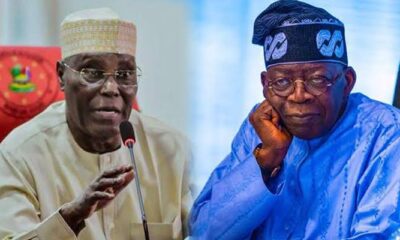

Nigeria: Atiku alleges Tinubu’s son, surrogates on board of firm awarded lucrative coastal highway contract
Former Nigerian Vice President, Atiku Abubakar, has alleged that President Bola Tinubu’s son, Seyi, and his surrogates are on the...
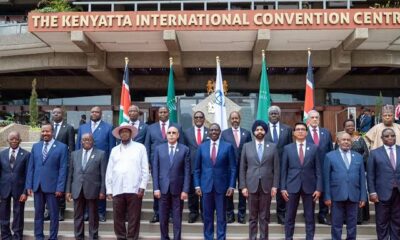

Behind the News: All the backstories to our major news this week
Over the past week, there were many important stories from around the African continent, and we served you some of...


Nigerian retail startup Renda secures $1.9m funding to drive expansion
Nigeria’s retail startup, Renda, has announced securing a $1.9 million pre-seed round of equity and debt funding to enable it...


Burna Boy emerges Africa’s top earning artiste in the US from tours, concerts
Nigerian Afrobeats sensation, Burna Boy, has emerged as the first African artiste to stage the highest-grossing arena concerts and tours...


Nigeria’s 4x400m mixed relay, 4×400 teams qualify for Olympics
Team Nigeria on Sunday morning booked two places at the upcoming Paris Olympics Games in the Mixed 4x400m relay and...


FX bank swaps account for 30% of Nigeria’s external reserves— Fitch
Global credit ratings firm, Fitch, has claimed that approximately 30% of Nigeria’s external reserves is comprised of foreign exchange (FX)...


Nigeria: Civil society group sues 36 govs, Wike over N5.9tn, $4.6bn loans
A civil society organisation in Nigeria, Socio-Economic Rights and Accountability Project (SERAP), has dragged the 36 state governors of the...
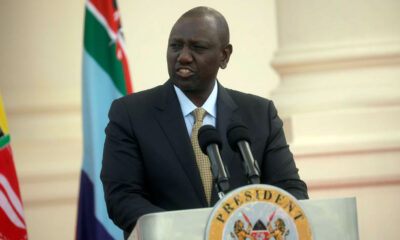

Kenya: President Ruto hints at ‘dire’ weather outlook as Cyclone Hidaya nears
President William Ruto has announced that the severe rains that have been plaguing Kenya for the past several weeks resulting...
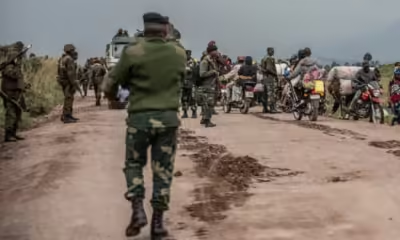

Again, Rwanda denies it attacked displaced persons in DR Congo
For the sixteenth time, Rwanda refuted US charges on Saturday that its troops attacked a camp for internally displaced persons...


Nigeria offers oil majors faster exit if …
Oil-rich West African country, Nigeria, has offered major oil companies, such as Exxon Mobil and Shell, that planned to leave...
Trending
-

 VenturesNow2 days ago
VenturesNow2 days agoNigeria offers oil majors faster exit if …
-

 Sports2 days ago
Sports2 days agoKenyan footballer arrested over brutal robbery, murder case
-

 VenturesNow1 day ago
VenturesNow1 day agoFX bank swaps account for 30% of Nigeria’s external reserves— Fitch
-
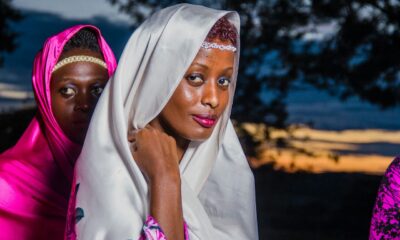
 Culture2 days ago
Culture2 days agoMeet the Ugandan tribe where bride’s aunt must ‘test’ groom’s manhood before marriage


